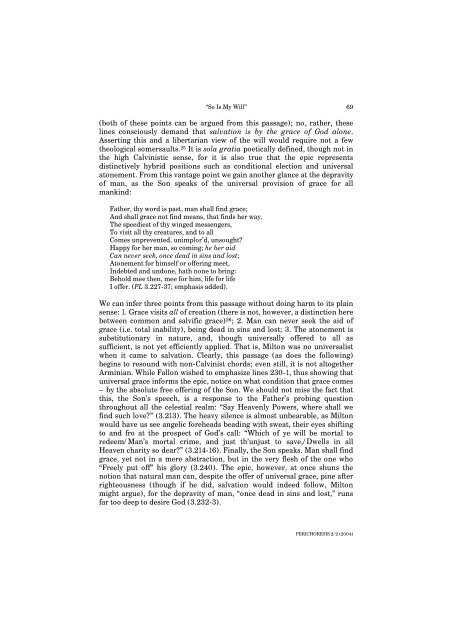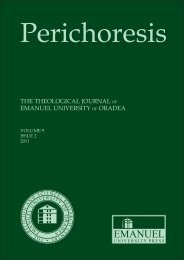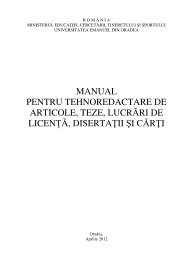Paradise Lost - Universitatea "Emanuel"
Paradise Lost - Universitatea "Emanuel"
Paradise Lost - Universitatea "Emanuel"
Create successful ePaper yourself
Turn your PDF publications into a flip-book with our unique Google optimized e-Paper software.
“So Is My Will”<br />
(both of these points can be argued from this passage); no, rather, these<br />
lines consciously demand that salvation is by the grace of God alone.<br />
Asserting this and a libertarian view of the will would require not a few<br />
theological somersaults. 25 It is sola gratia poetically defined, though not in<br />
the high Calvinistic sense, for it is also true that the epic represents<br />
distinctively hybrid positions such as conditional election and universal<br />
atonement. From this vantage point we gain another glance at the depravity<br />
of man, as the Son speaks of the universal provision of grace for all<br />
mankind:<br />
Father, thy word is past, man shall find grace;<br />
And shall grace not find means, that finds her way,<br />
The speediest of thy winged messengers,<br />
To visit all thy creatures, and to all<br />
Comes unprevented, unimplor’d, unsought?<br />
Happy for her man, so coming; he her aid<br />
Can never seek, once dead in sins and lost;<br />
Atonement for himself or offering meet,<br />
Indebted and undone, hath none to bring:<br />
Behold mee then, mee for him, life for life<br />
I offer. (PL 3.227-37; emphasis added).<br />
We can infer three points from this passage without doing harm to its plain<br />
sense: 1. Grace visits all of creation (there is not, however, a distinction here<br />
between common and salvific grace) 26 ; 2. Man can never seek the aid of<br />
grace (i.e. total inability), being dead in sins and lost; 3. The atonement is<br />
substitutionary in nature, and, though universally offered to all as<br />
sufficient, is not yet efficiently applied. That is, Milton was no universalist<br />
when it came to salvation. Clearly, this passage (as does the following)<br />
begins to resound with non-Calvinist chords; even still, it is not altogether<br />
Arminian. While Fallon wished to emphasize lines 230-1, thus showing that<br />
universal grace informs the epic, notice on what condition that grace comes<br />
– by the absolute free offering of the Son. We should not miss the fact that<br />
this, the Son’s speech, is a response to the Father’s probing question<br />
throughout all the celestial realm: “Say Heavenly Powers, where shall we<br />
find such love?” (3.213). The heavy silence is almost unbearable, as Milton<br />
would have us see angelic foreheads beading with sweat, their eyes shifting<br />
to and fro at the prospect of God’s call: “Which of ye will be mortal to<br />
redeem/Man’s mortal crime, and just th’unjust to save,/Dwells in all<br />
Heaven charity so dear?” (3.214-16). Finally, the Son speaks. Man shall find<br />
grace, yet not in a mere abstraction, but in the very flesh of the one who<br />
“Freely put off” his glory (3.240). The epic, however, at once shuns the<br />
notion that natural man can, despite the offer of universal grace, pine after<br />
righteousness (though if he did, salvation would indeed follow, Milton<br />
might argue), for the depravity of man, “once dead in sins and lost,” runs<br />
far too deep to desire God (3.232-3).<br />
69<br />
PERICHORESIS 2/2 (2004)




